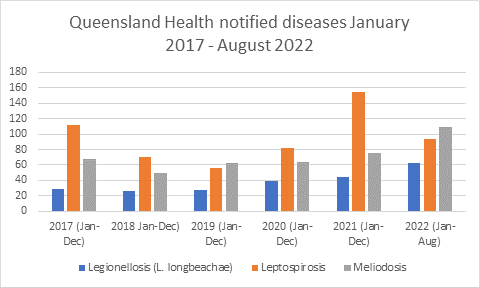Another La Nina? Working safely in the wet!
With higher than average rainfall so far this year and another La Nina summer on the way, it is no surprise there’s also been higher than average infection rates for wet-loving germs.
Working in muddy or wet conditions can expose workers to germs that cause diseases like legionella, leptospirosis and melioidosis. Sadly, cases of these diseases are being reported at rates up to three times that of the last few years.

Figures from Notifiable conditions annual reporting | Queensland Health
(The 2022 results are year to date but already are presenting as higher than in recent years.)
Legionella – can cause a severe pneumonia requiring intensive care. There are two main types—one that lives in air-conditioning cooling towers, and the other in soils, compost and potting mix. Read about Legionella risks from work with potting mix and compost.
Leptospirosis – is found in animal urine which can contaminate water and plants that humans are in contact with. It can cause serious illness needing intensive care. View our list of animal disease hazards.
Melioidosis – lives in soil and is mainly found in more tropical areas, but has caused illness in other regions this season. It can cause infection ranging from ulcers to pneumonia and sepsis. Read about working safely and Melioidosis.
People may be exposed to these diseases through breaks or wounds in the skin and sometimes by inhaling or swallowing contaminated water.
There are a few simple things you can do to protect yourself and reduce your risk of exposure when working in dirty, wet conditions.
Importantly, if you don’t have to go into murky water – don’t! But if you do have to work in potentially hazardous soil environments, take these precautions:
- Remove debris using machinery where you can.
- Wear protective clothing (long clothing to cover arms and legs to prevent scrapes and wounds to the skin, as well as boots and gloves - remembering to wash work clothes regularly).
- Wash your hands after removing PPE and before eating, smoking or touching your face.
- Clean and cover cuts, abrasions or other non-intact skin with a waterproof dressing.
- Where possible, avoid letting water lay around work areas near sheds and other buildings.
It is also important workers are up to date with their tetanus jabs.
Further information
Read more about infection risks from flood recovery and response work.